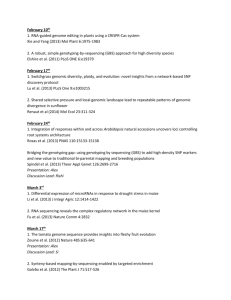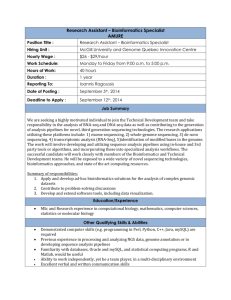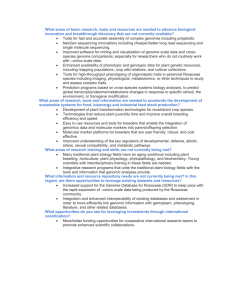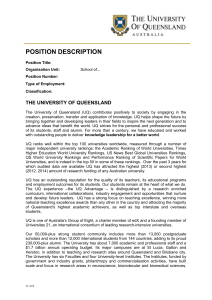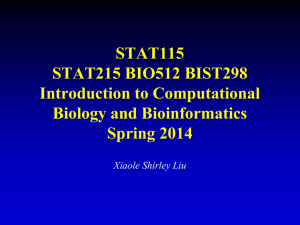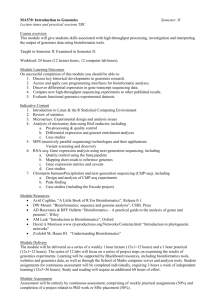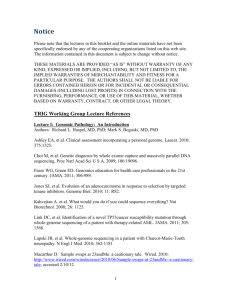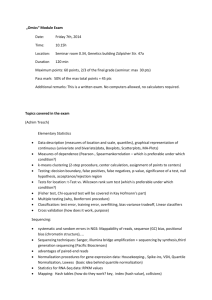Desirable - Applied Bioinformatics Group
advertisement
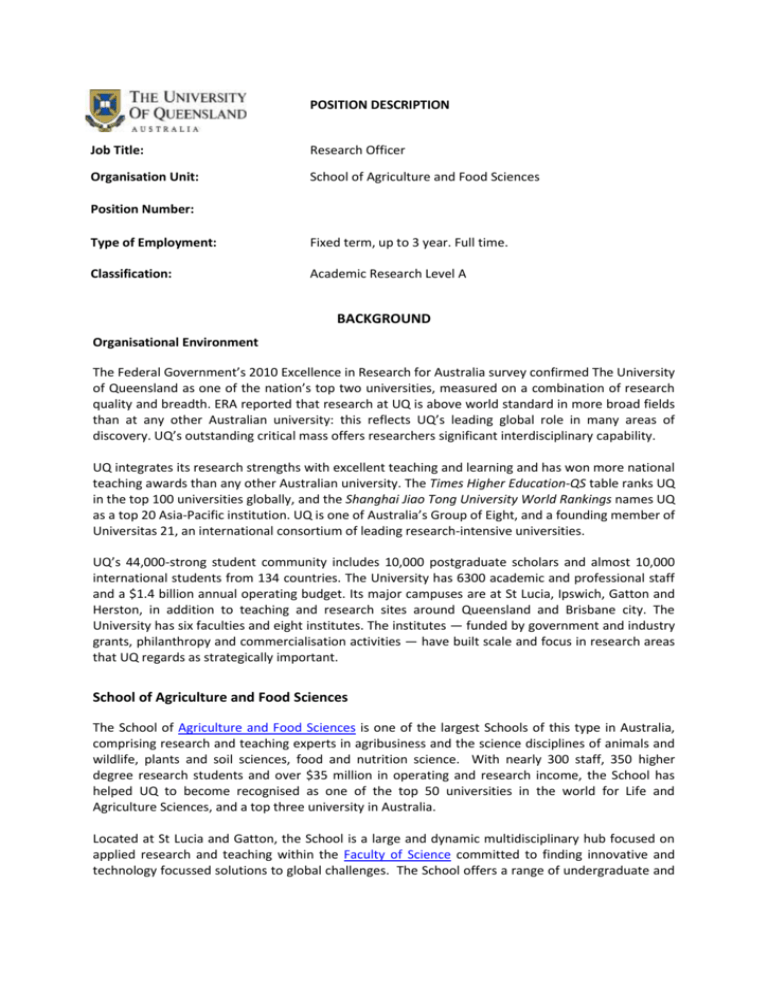
POSITION DESCRIPTION Job Title: Research Officer Organisation Unit: School of Agriculture and Food Sciences Position Number: Type of Employment: Fixed term, up to 3 year. Full time. Classification: Academic Research Level A BACKGROUND Organisational Environment The Federal Government’s 2010 Excellence in Research for Australia survey confirmed The University of Queensland as one of the nation’s top two universities, measured on a combination of research quality and breadth. ERA reported that research at UQ is above world standard in more broad fields than at any other Australian university: this reflects UQ’s leading global role in many areas of discovery. UQ’s outstanding critical mass offers researchers significant interdisciplinary capability. UQ integrates its research strengths with excellent teaching and learning and has won more national teaching awards than any other Australian university. The Times Higher Education-QS table ranks UQ in the top 100 universities globally, and the Shanghai Jiao Tong University World Rankings names UQ as a top 20 Asia-Pacific institution. UQ is one of Australia’s Group of Eight, and a founding member of Universitas 21, an international consortium of leading research-intensive universities. UQ’s 44,000-strong student community includes 10,000 postgraduate scholars and almost 10,000 international students from 134 countries. The University has 6300 academic and professional staff and a $1.4 billion annual operating budget. Its major campuses are at St Lucia, Ipswich, Gatton and Herston, in addition to teaching and research sites around Queensland and Brisbane city. The University has six faculties and eight institutes. The institutes — funded by government and industry grants, philanthropy and commercialisation activities — have built scale and focus in research areas that UQ regards as strategically important. School of Agriculture and Food Sciences The School of Agriculture and Food Sciences is one of the largest Schools of this type in Australia, comprising research and teaching experts in agribusiness and the science disciplines of animals and wildlife, plants and soil sciences, food and nutrition science. With nearly 300 staff, 350 higher degree research students and over $35 million in operating and research income, the School has helped UQ to become recognised as one of the top 50 universities in the world for Life and Agriculture Sciences, and a top three university in Australia. Located at St Lucia and Gatton, the School is a large and dynamic multidisciplinary hub focused on applied research and teaching within the Faculty of Science committed to finding innovative and technology focussed solutions to global challenges. The School offers a range of undergraduate and postgraduate coursework and research degrees encompassing agriculture and related disciplines ranging from Bachelor Degree to Doctorate. With a diverse group of internationally regarded scientists, the School hosts six research concentrations, of which three are aligned with the Queensland Alliance for Agriculture and Food Innovation – a joint initiative between The University of Queensland and the Queensland State Government. Quality laboratories and facilities and strong partnerships with industry, community and government bodies, provide an environment that enables world class research and research training in a collaborative and cooperative spirit for postgraduate students and researchers. Information for Prospective Staff Information can be found at https://www.uq.edu.au/uqjobs. DUTY STATEMENT Primary Purpose of Position To undertake research in the area of next generation sequencing technology. To develop and implement methods to analyse genetic and genomic data for the sequencing of complex genomes by the application of next generation sequencing technology. Duties Duties and responsibilities include, but are not limited to: Analysis of next generation sequencing data Undertake innovative research in the area of genome sequencing Undertake the analysis of genetic and genomic data Support ongoing bioinformatics developments for genome analysis Support the production of high quality, peer reviewed publications Support the training and development of staff and students within team Administration Perform a range of administrative functions in the School Contribute to the processes that enable the academic team to manage the work of the School, including participate in School decision-making and serve on School committees Comply with the University’s Code of Conduct (see the University’s web site at http://www.uq.edu.au/hupp/?page=24987) Adopt sustainable practices in all work activities and comply with associated legislation and related sustainability responsibilities and procedures developed by the University (see the University’s web site at http://www.uq.edu.au/sustainability/responsibilities Occupational Health and Safety Comply with requirements of Queensland occupational health and safety (OH&S) legislation and related OH&S responsibilities and procedures developed by the University or School. (see the University’s web site at http://www.uq.edu.au/ohs/index.html?page=133956) Reporting Relationships The position reports to A/Prof David Edwards. SELECTION CRITERIA Qualifications Essential Graduate or Postgraduate qualifications in the area of applied genomics or a combination of relevant experience and/or education/training Knowledge and Skills Essential Demonstrated knowledge of one or more aspects of applied genetics and genomics including: Comparative genomics analysis DNA sequence analysis and data mining Programming experience using Perl, Python or similar Familiar with Linux/Unix programming environment Desirable Knowledge of bioinformatics, genome sequencing, molecular genetic markers such as SNPs, Gene and genome annotation, genome sequencing Excellent problem solving and communication skills Experience Essential Significant experience in the analysis of genomic data Experience with the production of scientific reports, publications and training manuals Desirable Experience with the manipulation and analysis of genomic data using applied bioinformatics applications Experience in training researchers and students Personal Qualities Essential Well developed interpersonal skills, including the ability to work collaboratively with colleagues. Good time management skills with the ability to prioritise workloads. Good written communication skills with the ability to develop practical materials for students. The University of Queensland is an equal opportunity employer. Smoking is prohibited in all University buildings.
